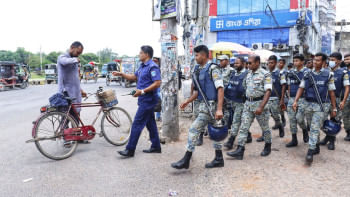The night that changed everything

It was the last Friday of Ramadan. A day when, Muslims believe, peace and compassion reign on earth. Ironically, this was the night when several armed Islamic militants attacked the Holey Artisan Bakery in Dhaka where guests were dining – many of them breaking their fasts. The attackers started the mayhem by invoking Allah's praise. The greater irony was that the Quran was then used as an instrument for killing – whoever could recite its verses was spared while the others were brutally tortured and hacked to death.
After the initial trauma, grief and shock, Bangladesh is reeling with a deep sense of guilt: how did it come to this? How could a country that fought a war for secularism and democracy become radicalised within a span of 44 years? Were there signs on the horizon? Were we in denial … or were we too complacent, thinking that the soft and tolerant religious culture that most believed in could not be tarnished by an extremist ideology? Whatever the answers, one thing is certain: Bangladesh has lost its innocence and the future is clouded in uncertainty. The question that is running through everyone's mind is: "Are we prepared for what will come next ?" The truth is: Do we even know what is next?
The past isolated, targeted militant attacks in the country have been followed by public outcry, a few political statements condemning terror, some perfunctory investigations and the matter was shelved both in the official archives and people's minds. The offenders thus enjoyed a degree of impunity that may have served as an encouragement. People are now wondering: Will the Holey massacre suffer the same fate?
While many of the broader challenges arising from terrorism need to be addressed politically and globally, as a community and society we must bear some direct responsibility. The time has come for action rather than venting frustration through OpEds, seminars and talk shows. It's not enough to mourn and shed tears; we need to go through some deep introspection to understand what we have learnt from this tragedy. Only then can we move forward.
Social media and news articles are emphasising the importance of good parenting to prevent teenagers from being drawn into extremism. However, parents must be cognizant of the fact that focusing on religion alone or the ritualistic aspects of religion may not be enough. They need to persistently emphasise the core human values of compassion, tolerance and respect for diversity. For, religion can only provide a moral compass – one cannot expect children to fight their ethical battles unless parents provide some universal guidelines of "right and wrong".
Many modern parents are reluctant to probe too deep into their children's lives since they believe that intrusive parenting curbs initiative and independent thinking . . . ingredients of success in life. But a six-month disappearance of a child from the radar screen should raise red flags for both the family and the law enforcement agencies. If there is a lesson to be drawn from Holey, it is that the parents and authorities need to collaborate assiduously to track the whereabouts of missing children, who could be in the process of being trained as terrorists.
On a global and national level, it's time for the "silent majority" of peace-loving Muslims to find their voice and register their protest against obscurantism, bigotry and sectarianism. It's true that they feel helpless because they fear reprisals, even death. Hence governments must provide the security as well as space for free speech and contestable politics. There is no denying that a political vacuum where there is no room for healthy debate and where there are cracks in national unity provides opportunities for extremist subversive activity. It is time that the political parties and civic society came together to fight the threat of terrorism.
As we hang down our heads in shame because the militants were homegrown, we can also be proud of the Bangladeshis who demonstrated exceptional courage and empathy even under threat of death. Faraaz Hossain, having passed the Quranic test, could have walked out to freedom. But he refused to abandon his friends Abinta Kabir and Tarishi Jain who were held hostage because of their nationality and/or religion. He lost his life, but his compassion and courage will be an inspiration for future generations. Reportedly, Ishrat Akhond declined to be dictated by the misguided, misogynistic Islamic extremists and paid a heavy price with her life. They are our heroes whose memory will remain etched in our minds and they will live in our hearts forever.
We pray for all the victims whose lives were lost in this brutal, mindless act of terror. We salute them with the humble realisation of how, as members of the community, we failed them. But let us promise that we will not forget the message they left behind for us: that all of us must resolutely stand up against terrorism and fight for humanity.
The writer is a renowned Rabindra Sangeet exponent and a former employee of the World Bank.

 For all latest news, follow The Daily Star's Google News channel.
For all latest news, follow The Daily Star's Google News channel. 



Comments